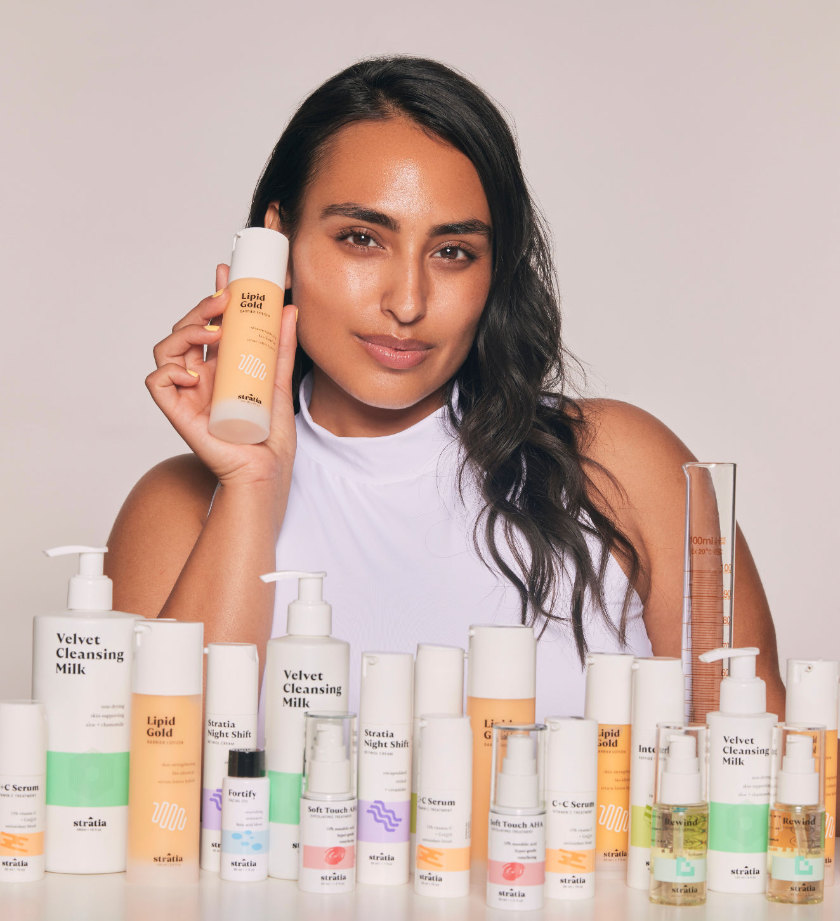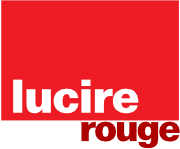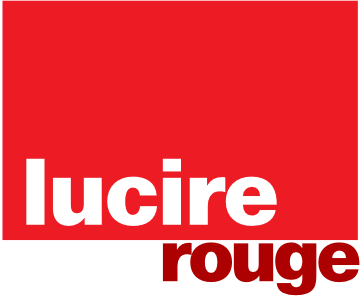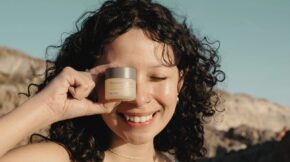Into the Stratia-sphere: how Stratia founder Alli Reed trusted science instead of hype to create one of indie beauty’s favourite upstarts
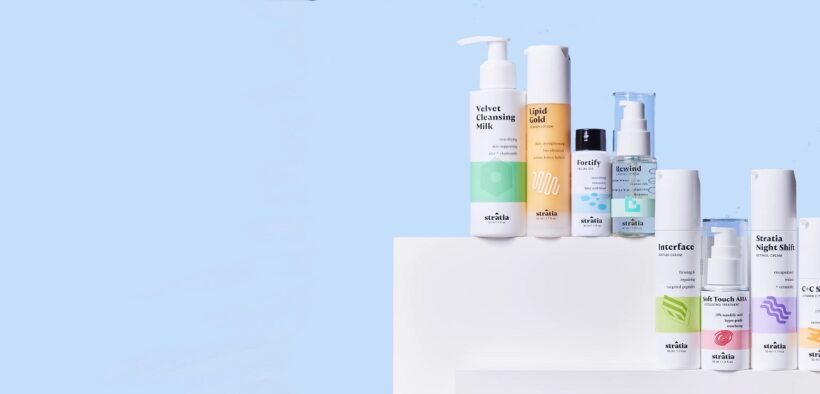

You can take a girl out of chemistry, but you can never take chemistry out of a girl. Especially not UC Berkeley chemistry grad Alli Reed. Even after a long, but ultimately unsatisfying, detour into career copywriting, Reed could not be cured of her obsession with molecules, formulas and periodic tables. It just needed the right spark.
Like many skin care company founders, Reed was not pleased with the products available to her as a consumer. If there were chemicals, they weren’t the right ones. If the they were organic, they were ineffective. So what does a chemistry grad do when skin care doesn’t work for her? She deep dives into dermatology journals, cosmetic chemistry books and ingredient encyclopædias. Then she sets up her kitchen laboratory and gets to work. And when she comes up with formulas she likes, she shares them with friends. And their friends. And their friends’ friends. You get the trajectory.
That is the story of Alli Reed and Stratia. One of the surprise success stories of direct-to-consumer skin care. What started in a kitchen is now manufactured in a hip downtown Los Angeles factory. Their best seller Liquid Gold sells out whenever it’s in stock. Their website prides itself on complete transparency and consumer skin care education. It even includes an ingredient dictionary so all us non-chemists know what goes on our skin and why it works. Stratia keeps no secrets. Only solutions for great skin for every age, gender, lifestyle and orientation.
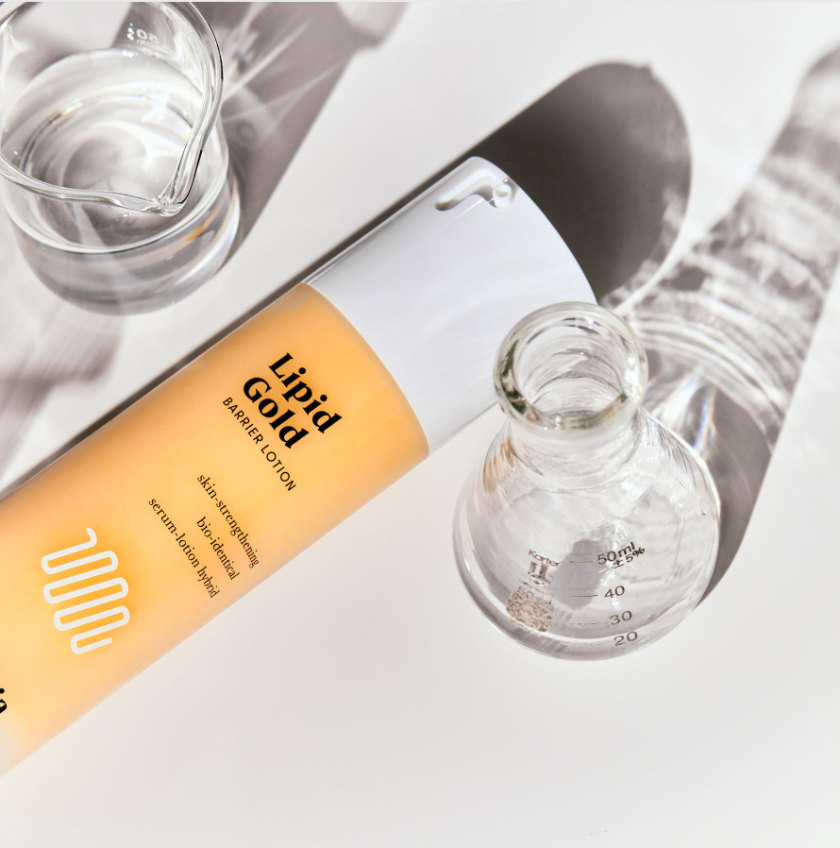
We had the pleasure to speak with Reed about everything Stratia and some common cosmetic industry misconceptions, and yes, misrepresentations.
Lucire Rouge: Before Stratia, you did not have any beauty industry experience. What drew you into this field?
Alli Reed: When I started Stratia, I didn’t really intend to start a skin care company. I never really expected that it would turn into anything more than a little side hustle. I never worked in the beauty industry. I came at it as a very passionate skin care consumer and as a scientist. I studied chemistry in college and didn’t do anything with my degree, and at the same time was so fascinated by skin care. Skin care is science. It can actually affect how an organ functions. And I was so fascinated by that.
Although you were a chemistry major in university, how did you learn about skin care science after so many years away from the field?
I did everything I possibly could to learn about how the skin works on a biological level. How skin care is formulated, and the interaction between the dermis and a product. I got to a point where I was really well educated on skin and skin care and found that it wasn’t helping me shop as a consumer. The only information I could get about a product is whatever was trickling through a brand’s marketing department. So I decided to cut out the middleman, combine my chemistry background with all this research I had been doing and start formulating skin care for myself that I knew aligned with the research. So I started formulating it for myself, ended up with a couple of formulas that I really liked. I gave people samples and they liked them, too. I just launched a little side hustle, and it just took off totally organically.
Once you started to expand, did you have a consumer demographic in mind?
I wasn’t really coming at it from the point of what’s a good consumer niche. I was just trying to create skin care for myself that I knew would work, not just good marketing. I created a formula that could stand up on its own. And that’s always been my philosophy when formulating—that the formulation drives the marketing and not the other way around.
So, in a sense, your niche found you.
I think so, although it was unintentional. I think where we have found differentiation is that we are so efficacy-focused. We are so driven by science, rather than fads. If something works on your skin today, it’ll work 20 years from now. It would have worked 20 years ago. We’re also just hyper-focused on transparency, science education, as well as accessibility and keeping our products affordable, gender-free and testing it on as many hundreds of faces as possible before we launch it. So I know it’s gonna work on every skin type, tone, texture, age, gender, anything.
You are quite vocal about the marketing hype in favour of clean and organic skin care. As a trained chemist, why did you decide to go against such a monumental trend?
My position on “clean beauty” is that if clean means not using ingredients that are harmful to your health, absolutely, we’re clean. But that’s not what clean means. Clean means not using this ever-growing, arbitrary list of ingredients that for some reason are maligned as a way to sell products through fear. Thus, saying other people’s products will kill you, but ours are safe. I think that’s a pretty disingenuous way to go about marketing a product. Europe bans 1,400 ingredients, while the USA only bans seven. If you look at the ingredients that are banned in cosmetics in Europe, it’s ingredients like naloxone, the drug that reverses opiate overdose. In the USA with the FDA, we say if it contains any of these ingredients, it’s a drug, so it’s regulated as a drug, not a cosmetic. If it doesn’t have those ingredients, it’s regulated as a cosmetic. And these are the seven or whatever ingredients that you can’t have in it. In the EU, they just say if it’s cosmetic, it can’t have any of these drug ingredients. It’s not that the EU is any safer, it’s just in the USA it would be a drug and would be strictly regulated under drug laws.
Do you think there is a compromise on efficacy if a product is totally clean or organic?
Absolutely. And I think that’s why a lot of people are starting to switch their buying habits from a clean focus to an efficacy focus. There are plenty of effective clean products, but there’s not a huge overlap in that Venn diagram. I think it comes down to the fact that with ‘clean’ you’re defining what is excluded in a product.
How are Stratia products created for maximum efficacy?
So when I start formulating, it’s typically borne out of both academic and consumer research. And then the fun thing about being both in charge and the formulator is I get to define what the product will be. I’m not encumbered by anything. So I tend to either look at a star ingredient I want to focus on or a specific effect I want the product to have.
What are some of your star ingredients?
For example, with our Night Shift, I knew I wanted to make a retinol product. I knew retinol is really unstable, so I wanted it to be with encapsulation technology. And I knew that retinol can also be irritating. So I wanted to make sure that the vehicle formula, the cream it’s in, is really nourishing and rich and soothing to help minimize irritation. Our star product, Liquid Gold, was built out of studies about the ideal ratios of ceramides, cholesterol, and fatty acids in skin barrier repair. I knew that I wanted those three ingredients in a specific ratio. And then I built the formula around that to make sure it had everything else I wanted.
How do you think Stratia transitioned from cult status to major skin care industry player?
I am not a marketer. All my points are in my left brain. I am science. I am logistics. I was just creating these products and hoping people would buy them. And they did to some degree, but there was no marketing happening. I didn’t really know how to translate these 10,000-word screeds I would write about the importance of pH and skin care into a way that felt accessible and exciting to a consumer. It really has been my reliance on marketing professionals and my team to figure out how to translate that efficacy, that passion, that transparency into a way that feels exciting and engaging.
Where is Stratia available for purchase?
We have reached a lot of people and we’re growing pretty fast year after year. At this point, we are available almost exclusively online at our website and Amazon.
What is in the future for Stratia?
My plan for Stratia has kind of always been the same, but bigger. I will continue to formulate all the products. We will continue to launch products that fill gaps both in our product line and in the market at large. I am constantly reading new studies about ingredients and formulas to stay on top of developments in the market. I do think what’s next for us is expanding who we reach and where you can buy Stratia.
To learn more or purchase Stratia, please visit www.stratiaskin.com.
